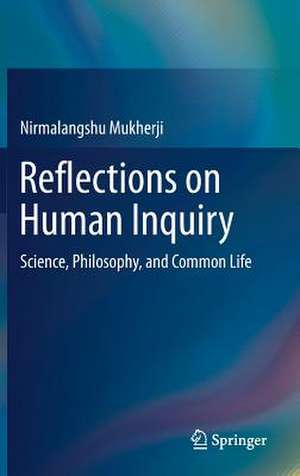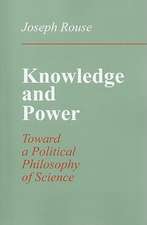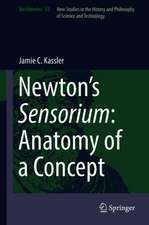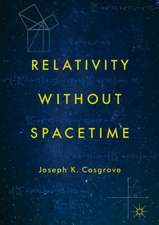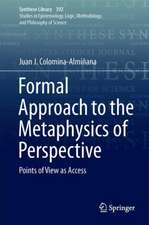Reflections on Human Inquiry: Science, Philosophy, and Common Life
Autor Nirmalangshu Mukherjien Limba Engleză Hardback – 9 noi 2017
With the emergence of the scientific study of the human mind itself, these critical questions have taken a more intriguing form in recent decades. Can human inquiry investigate its own nature? Can the scientific theory of language explain the richness of human expression? Can a science of the mind account for human experience? These probing questions on the scientific enterprise are usually addressed from the outside, as it were, by humanists and critical theorists. In these essays, they are examined from the inside by a philosopher whose primary academic work concerns the study of the human, linguistic mind. In that sense, the sceptical inquiry turns on itself.
| Toate formatele și edițiile | Preț | Express |
|---|---|---|
| Paperback (1) | 361.03 lei 38-44 zile | |
| Springer Nature Singapore – 12 dec 2018 | 361.03 lei 38-44 zile | |
| Hardback (1) | 392.37 lei 6-8 săpt. | |
| Springer Nature Singapore – 9 noi 2017 | 392.37 lei 6-8 săpt. |
Preț: 392.37 lei
Nou
Puncte Express: 589
Preț estimativ în valută:
75.08€ • 78.60$ • 62.12£
75.08€ • 78.60$ • 62.12£
Carte tipărită la comandă
Livrare economică 05-19 aprilie
Preluare comenzi: 021 569.72.76
Specificații
ISBN-13: 9789811053634
ISBN-10: 9811053634
Pagini: 203
Ilustrații: XIII, 203 p.
Dimensiuni: 155 x 235 mm
Greutate: 0.52 kg
Ediția:1st ed. 2017
Editura: Springer Nature Singapore
Colecția Springer
Locul publicării:Singapore, Singapore
ISBN-10: 9811053634
Pagini: 203
Ilustrații: XIII, 203 p.
Dimensiuni: 155 x 235 mm
Greutate: 0.52 kg
Ediția:1st ed. 2017
Editura: Springer Nature Singapore
Colecția Springer
Locul publicării:Singapore, Singapore
Cuprins
Chapter 1. Introduction to Reflective Pluralism.- Chapter 2. Human Reality.- Chapter 3. Science and the Mind.- Chapter 4. Theories and Shifting Domains.- Chapter 5. The Sceptic and the Cognitivist.- Chapter 6. From Things to Needs.- Chapter 7. Yearning for Consciousness.- Chapter 8. Ascription of Knowledge.- Chapter 9. Beliefs and Believers.- Chapter 10. Varieties of Interpretation. Chapter 11. Literature and Common Life.- Chapter 12. Education for the Species.
Recenzii
“Mukherji’s volume is very rich, bringing together a number of issues in recent/late twentieth century philosophy, without being overwhelming. … Well written, this is an enjoyable book to read, that seeks to bring philosophical debate to a broad audience.” (William Sweet, Sophia, Vol. 59, 2020)
Notă biografică
Nirmalangshu Mukherji is a former Professor of Philosophy at the University of Delhi. He is the National Visiting Professor for Indian Council of Philosophical Research (2015-16). His primary academic interest is the study of language and mind. His publications in this broad area include The Cartesian Mind: Reflections on Language and Music (2000) and The Primacy of Grammar (MIT, 2010). He also co-edited Noam Chomsky’s The Architecture of Language (OUP, 2000). Professor Mukherji is also professionally interested in the nature of human inquiry, including the character of philosophical practice. Some of his work in this area is collected in the present book. He is actively engaged with issues of peace, justice and human rights. Apart from many dozens of articles, he has two books: December 13: Terror over Democracy (Bibliophile South Asia, 2005) and Maoists in India: Tribals under Siege (Pluto 2012, Amaryllis 2013).
Textul de pe ultima copertă
The twelve exploratory essays collected in this volume examine forms and limits of human inquiry. Where does scientific inquiry significantly apply? Can it cover the vast canvas of human experience? Where do other forms of inquiry, such as philosophy and the arts, attain their salience? With the emergence of the cognitive sciences, these questions have become more intriguing. Can human inquiry investigate its own nature? They are examined by a philosopher whose academic work concerns the study of language and mind; as such, the sceptical inquiry turns on itself.
[The] essays are reflections of a fine scholar... Their range is wide, and they are at once rigorous and accessible. They … are wise in their understanding of the limits of science’s reach into the domain of what he calls ‘common life’. They will be a source of much pleasure and instruction and insight to the serious reader. Akeel Bilgrami, Johnsonian Professor of Philosophy, Columbia University
With remarkable range and depth, these tantalizing essays explore scientific and cultural forms of inquiry, ... and other topics that have inspired reflection on the world and ourselves for ages. At each point, there are instructive and challenging new perspectives and insights … a welcome gift to the inquiring mind.
Noam Chomsky, Institute Professor of Linguistics and Philosophy, Massachusetts Institute of Technology
Mukherji's interests go well beyond narrow academic concerns. His writings reflect the breadth of his aspirations and should appeal to the general public as well as to the experts.
Francois Recanati, Senior Fellow, CNRS, Paris
[The] essays are reflections of a fine scholar... Their range is wide, and they are at once rigorous and accessible. They … are wise in their understanding of the limits of science’s reach into the domain of what he calls ‘common life’. They will be a source of much pleasure and instruction and insight to the serious reader. Akeel Bilgrami, Johnsonian Professor of Philosophy, Columbia University
With remarkable range and depth, these tantalizing essays explore scientific and cultural forms of inquiry, ... and other topics that have inspired reflection on the world and ourselves for ages. At each point, there are instructive and challenging new perspectives and insights … a welcome gift to the inquiring mind.
Noam Chomsky, Institute Professor of Linguistics and Philosophy, Massachusetts Institute of Technology
Mukherji's interests go well beyond narrow academic concerns. His writings reflect the breadth of his aspirations and should appeal to the general public as well as to the experts.
Francois Recanati, Senior Fellow, CNRS, Paris
Caracteristici
Provides a philosophical analysis of human knowledge systems Examines the relationship between science, philosophy, and the arts as forms of inquiry Studies the role of textuality, traditions and human needs in shaping human inquiry Includes supplementary material: sn.pub/extras
